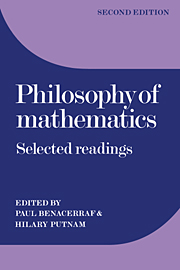Book contents
- Frontmatter
- Contents
- Preface to the second edition
- Introduction
- Part I The foundations of mathematics
- Part II The existence of mathematical objects
- Empiricism, semantics, and ontology
- On platonism in mathematics
- What numbers could not be
- Mathematics without foundations
- Part III Mathematical truth
- Part IV The concept of set
- Bibliography
Empiricism, semantics, and ontology
Published online by Cambridge University Press: 05 June 2012
- Frontmatter
- Contents
- Preface to the second edition
- Introduction
- Part I The foundations of mathematics
- Part II The existence of mathematical objects
- Empiricism, semantics, and ontology
- On platonism in mathematics
- What numbers could not be
- Mathematics without foundations
- Part III Mathematical truth
- Part IV The concept of set
- Bibliography
Summary
The problem of abstract entities
Empiricists are in general rather suspicious with respect to any kind of abstract entities like properties, classes, relations, numbers, propositions, etc. They usually feel much more in sympathy with nominalists than with realists (in the medieval sense). As far as possible they try to avoid any reference to abstract entities and to restrict themselves to what is sometimes called a nominalistic language, i.e., one not containing such references. However, within certain scientific contexts it seems hardly possible to avoid them. In the case of mathematics, some empiricists try to find a way out by treating the whole of mathematics as a mere calculus, a formal system for which no interpretation is given or can be given. Accordingly, the mathematician is said to speak not about numbers, functions, and infinite classes, but merely about meaningless symbols and formulas manipulated according to given formal rules. In physics it is more difficult to shun the suspected entities, because the language of physics serves for the communication of reports and predictions and hence cannot be taken as a mere calculus. A physicist who is suspicious of abstract entities may perhaps try to declare a certain part of the language of physics as uninterpreted and uninterpretable, that part which refers to real numbers as space-time coordinates or as values of physical magnitudes, to functions, limits, etc.
Information
- Type
- Chapter
- Information
- Philosophy of MathematicsSelected Readings, pp. 241 - 257Publisher: Cambridge University PressPrint publication year: 1984
Accessibility standard: Unknown
Why this information is here
This section outlines the accessibility features of this content - including support for screen readers, full keyboard navigation and high-contrast display options. This may not be relevant for you.Accessibility Information
- 9
- Cited by
